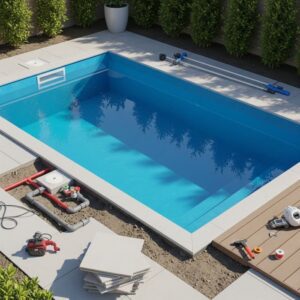Blog

Why more Austinites are switching from big pool companies to Cutters Pools
Austin homeowners love their pools — but not always the companies that maintain them. In recent years, more Austinites are making the switch from large, impersonal pool companies to Cutters Pools, a local Austin pool builders known for its personalized approach, affordable pricing, and high-quality craftsmanship. Reasons Why Austinites are Switching Big Pool Companies to

Small Pool Trends in Texas for 2025
When you think of backyard pools, you might envision vast, sprawling spaces with high-maintenance designs. But in 2025, smaller is often better. With limited space in suburban areas and urban environments, more homeowners in Texas are opting for small pools designs that deliver the perfect balance of luxury and practicality. Small pools offer a cool, refreshing escape without the hefty price tag or extensive upkeep of their larger counterparts.

Cost of Installing a Small Pool in Austin
Thinking of installing a pool in your Austin backyard but don’t have the space (or budget) for a traditional one? Small pools — also called plunge pools or cocktail pools — are rapidly gaining popularity in Austin neighborhoods like Mueller, East Side, and South Congress for their modern aesthetics and lower cost. But how much

Small Pools vs Hot Tubs: What’s Best for Austin Homes?
When it comes to upgrading your Austin home with a luxurious outdoor feature, two popular options often come to mind: small pools and hot tubs. Both offer a relaxing and stylish addition to your backyard, but the right choice depends on your lifestyle, space, and how you envision using your outdoor oasis. In this blog

Top 10 Small Backyard Pool Ideas in Austin for 2025
Austin’s hot climate and laid-back lifestyle make backyard pools a dream feature for many homeowners. But what if you don’t have acres of land? The good news is—you don’t need a sprawling yard to create a stunning oasis. With smart design and clever planning, even a small space can be transformed into a luxurious, refreshing

Cost of Install a Small Pool in Georgetown
When the summer heat hits, there’s nothing better than having a refreshing pool right in your backyard. If you’re considering installing a small pool in Georgetown, you’re probably wondering about the costs involved. While the price can vary depending on a variety of factors, this guide will give you an overview of what you can expect when it comes to the cost of installing a small pool in Georgetown.

Top 5 Swimming Pool Contractors in Austin, TX
If you’re considering installing a swimming pool in Austin, TX, it’s essential to choose a reliable and experienced contractor who can bring your vision to life. The right contractor can ensure quality work, timely completion, and a swimming pool that meets all your needs. To help guide you through your decision, we’ve compiled a list

How to Choose the Right Pool Shape for Your Backyard
Choosing the right pool shape is one of the most exciting and important decisions you’ll make when designing your dream backyard oasis. The shape of your pool not only influences the aesthetic and ambiance of your outdoor space but also affects functionality, maintenance, and overall enjoyment. Whether you’re planning a sleek modern pool or a

Benefits of Saltwater Pools in Texas Heat
Texas summers are no joke. With temperatures often soaring above 100°F, having a swimming pool isn’t just a luxury—it’s practically essential. But not all pools are created equal. More and more homeowners in Texas are turning to their trusted pool builder to opt for saltwater pools over traditional chlorine ones. Why? Because saltwater pools offer